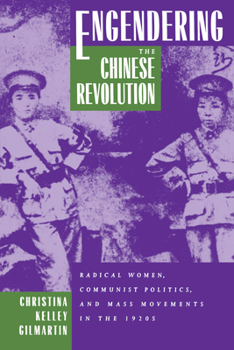Engendering the Chinese Revolution
Select Format
Select Condition 
Book Overview
Christina Kelley Gilmartin rewrites the history of gender politics in the 1920s with this compelling assessment of the impact of feminist ideals on the Chinese Communist Party during its formative years. For the first time, Gilmartin reveals the extent to which revolutionaries in the 1920s were committed to women's emancipation and the radical political efforts that were made to overcome women's subordination and to transform gender relations. Women...
Format:Paperback
Language:English
ISBN:0520203461
ISBN13:9780520203464
Release Date:November 1995
Publisher:University of California Press
Length:302 Pages
Weight:1.10 lbs.
Dimensions:0.8" x 6.1" x 9.0"
Customer Reviews
1 rating
A review
Published by Thriftbooks.com User , 24 years ago
In Engendering the Chinese Revolution, Christina Gilmartin examines the politics and history of the Communist Party between 1920 to 1927 with a gendered perspective. Gilmartin tries to define and analyze the tension and ¡§uneasy¡¨ relationship between class and gender, and between the Communist Party and the women¡¦s movement. Instead of giving an overview of women¡¦s history in the premodern period and telling the entire history of the Communist regime up to the present, Gilmartin focuses on the 1920s, which she suggests as a honeymoon period for the union of feminism and social movements. I would assume she concentrates on those years because it was a period under direct influence of the May Fourth and when the ideological origins for both feminism and socialism started to form. If this is true, she may be suggesting that there is no fundamental conflict between feminism and class struggle, but it was only the divide between the Nationalist Party and the Communist Party, the practices and implementation policies that create the contradictions, starting from the later half of the 1920s. In the beginning, she focuses on how women¡¦s emancipation is utilized as an anti-imperialist and anti-tradition ideology by the nationalist movement in the early 20s. Gilmartin emphasizes the influence of the May Fourth movement shaping the discourse on feminism. She argues that most male communists also embrace feminist issues at that time. Although some anarchists ¡§challenged the essentialist nature of the bond between nationalism and feminism¡Kthey did not¡K succeed in their aim of irrevocably breaking the tight connection between nationalism and feminism.¡¨ (21) However, besides emphasizing the nationalist fervor and intellectuals¡¦ wish in declaring a ¡§full-scare war on the entire Chinese cultural heritage,¡¨ Gilmartin stops short in explaining why people could not untie the connection. Why is nationalism compatible and tightly connected with women¡¦s issues without dispute? Is it because the May Fourth Movement is embraced with no dispute that every issue under its flag is taken in? Compared with the dilemma between socialism and feminism, nationalism does not seem to contradict with feminism. The first part of the book is successful in analyzing the experiences of women activists in the party and how they overcome the obstacles in pushing their agenda and ascending in the party. The author has spent great effort finding and using the memoirs and biographies of activists to engender the history. I find Chapter Four a bit loaded with the author¡¦s moral language though, especially in her examination of Chen Duxiu¡¦s and Zhang Shenfu¡¦s sexual and marriage life. (111) The reporting on Chen¡¦s and Shen¡¦s behaviors through digging into others¡¦ memoirs and accusations seem unnecessary and loaded with biased judgment, if her intention is to prove their inattention and unawareness of traditional notions






